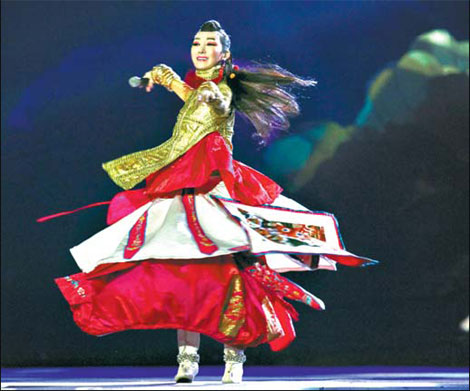People
In good voice
Updated: 2011-04-26 07:55
By Chen Nan (China Daily)
She studied music formally and won a national singing competition in 1999 at the age of 16.
|
On stage, Sa is dynamic and flamboyantly dressed. Zhang Xiaoli / For China Daily |
However, she was told her ethnic music would not sell well. So she did a dance music album (one of the nation's first) which was popular and performed at the CCTV Spring Festival Gala in 2001 and 2002.
She was known then as Zhou Peng and later took the stage name Sa Dingding, which is from her mother's Mongolian surname and a childhood nickname.
"When I was young, my music path was designed by teachers and catered to the music market. I just kept what I really wanted to sing in my heart and waited for a moment to fulfill it," says Sa, who calls the days of being "Zhou Peng" "childish", but nevertheless a valuable experience, which strengthened her mind to sing her heart out.
Taking a long break, which was long enough for people to forget about her, she released Alive in 2007, an album that mixes traditional Chinese melodies and Buddhist mantras with electronic instruments.
The album saw Sa not only sing in Mandarin and Mongolian but also in Tibetan, Sanskrit and, Zi Yu, a language of her own invention.
She poses like the Buddha in promotional photos, even though she is not a Buddhist. "Buddhism is a big part of Chinese culture. Both my mother and grandma are Buddhists," she says. "I'm interested in learning about it."
Her exotic appearance - self-designed ethnic-style clothing, braids and bangles - was influenced by her mother. "My mother loves designing and knitting clothing and accessories," Sa says.
In 2008, she won the BBC music award, which ushered Sa onto the international stage. While touring European countries and the United States, she gradually became recognized as a crossover musician from China and got her nickname of the "Asian Bjork" by Western media.
For her second album in January 2010, Harmony, Sa absorbed influences from ethnic groups in Yunnan province and invited folk musicians to join her band. The album topped iTunes' World Music chart before officially going on sale.
The Guardian gave her second album four stars upon its UK release in March 2010, describing the title song, Ha Ha Li Li "the most propulsive deep bass groove for Sa Dingding's vocal blend of stealthy intimacy and keening ululation".
For Sa, it meant she had taken control of her career.
 |
"If Alive was an accidental success, then Harmony proved I was a musician, bringing Chinese music to the international stage," she says. "My way of working is that whenever I have a feeling I can write a song very quickly. It is not a big burden, it is a natural and fluid process."
To further her musical dreams, Sa is going to open a live music venue in Beijing's 798 art district. The two-floor building, which has a capacity of about 40, will be called Seven, referring to reincarnation. Sa plans to invite Chinese folk musicians from ethnic groups to perform.
"The live music venues in Beijing mainly play rock, punk, jazz, hip-hop and other music genres from the West. I want to offer people a place to feel authentic Chinese music from folk artists," she says. "The venue is small but audiences can get a close look at the artists, their costumes, instruments and facial expressions."
She says that in the past mainland musicians looked to the West for ideas about contemporary art without drawing on their own cultural roots. She thinks it's time for Chinese artists to embrace their own culture and look for a Chinese voice.
Specials

Models gear up car sales
Beauty helps steer buyers as market accelerates.

Urban breathing space
City park at heart of industrial hub positions itself as top tourism attraction

On a roll
Auto hub Changchun also sets its sight on taking lead in railway sector
